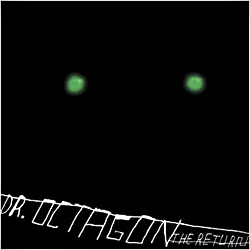Dr. Octagon
The Return of Dr. Octagon
(OCD International)
On the 1996 hip-hop cult classic Dr Octagonecologyst, Dan the Automator helped transform ex-Ultramagnetic MC Kool Keith from Bronx-based rhyme innovator to California-livin’, B-movie mad scientist. In the years since, Keith’s output has been prolific, ranging from the aural porno-core of Sex Style to the quirky Moog-beats of Black Elvis, a misunderstood effort that ended his relationship with the majors. A follow-up appointment with the good doctor has remained a tantalizing prospect; the product, however, could use a shot in the arm. The Return features production by the Berlin-based trio One Watt Sun, whose future-funk varies little from track to track. What made the original Dr. Octagon record so exciting was the Automator’s ability to combine traditional hip-hop with a sci-fi sensibility. One Watt Sun’s electro-jazz seems to be trying too hard to be weird, even occasionally inflecting Keith’s vocals with a superfluous stuttering effect. Besides a few skits and one eponymous track, it’s difficult to see what this album has to do with the Dr. Octagon persona. While “Ants” and “Al Green” sport Keith’s gleefully deranged rhymes, he assumes a bizarre Leonard Cohen cadence on the bluesy “A Gorilla Driving a Pick-up Truck.” Princess Superstar puts in a spirited performance on “Eat It,” but her hip-hop version of Peaches doesn’t quite cure this patient. On its own, this record has some footing, but as Octagon Part 2, it falls short. For the real shit, check out Keith’s recent Mr. Nogatco—this is the return to space-cadet rap we’ve been waiting for. JONAH FLICKER
Kékélé
Kinavana
(Stern’s Music)
The African supergroup Kékélé are a wise and shrewd bunch—they have over a century of experience in the import/export trade of Congolese music. Kinavana is the group’s third release; the previous two were masterful hybrids of Congolese dance music and Cuban rumba that played as precisely balanced trade-offs between the two styles—it was like down-tempo Congolese. Kinavana, on the other hand, is their Havana moment, sounding akin to a session with Buena Vista expats. Kinavana calls on an impressive lineup of Cuban and Congolese musicians to add layers of classic Cubano: sinewy horn arrangements, classical guitar lines, tremulous bass lines, wallowing vocals, and conga drums. The way it’s executed, you come off believing there’s not a huge difference between Congolese and Cuban roots. That’s somewhat true; Havana may as well be a Congo River tributary, but when Kékélé stick more to the Congolese speed, Kinavana excels; when they don’t, it sulks, which might be the point. CHRIS COOMEY
Kékélé play the Triple Door, 216 Union St., 206-838-4309, www.tripledoor.net. $22.50 adv./ $26 DOS. 7 p.m. and 10 p.m. Thurs., June 6.
Tilly and the Wall
Bottoms of Barrels
(Team Love)
Omaha fivesome Tilly and the Wall are often branded as a gimmick band for crafting their rhythm section with a real live tap dancer, but this sorely underestimates their musical prowess. The rapid metallic slap of steel shoes blends in delicately with the group’s quirky, prancing melodies and sweetly crooned boy-girl harmonies—and is perhaps not even apparent to those who don’t know the actual source of the sound. Bottoms of Barrels, their second disc and follow-up to 2004’s romper, Wild Like Children, is charming and sincere, gently lulling even the most difficult listener into submission. One might be quick to assume that Tilly’s indie-rock popularity is a direct result of their fast-clicking tapper, but it becomes exceptionally apparent that the group’s appeal is a bit more intricate once the disc begins to spin. EMILY ZEMLER
Tilly and the Wall play the Paradox, 1401 N.W. Leary Way, www.theparadox.org. $8 adv./ $10 DOS. All ages. 7:30 p.m. Tues., July 11.
Black Helicopter
Invisible Jet
(Ecstatic Peace)
“The Buick Elektra was something to admire/It got me there and back, it stood the test of time,” Black Helicopter frontman Tim Shea appreciatively notes near the start of Invisible Jet, but he might as well be describing his own band’s sound—solid, dependable, and capable of leaving a little tire rubber on the asphalt, but nothing too spectacular. Shea, whose singing voice falls somewhere between those of Scott “Spiral Stairs” Kannberg and J. Mascis, is what makes Black Helicopter’s rangy meat-and-potatoes workouts worth returning to. The man has a soft spot for all manner of sad sacks and erects sturdy narrative windows into their doldrums: the embittered, since-replaced ex-husband venting on the grungy, ramshackle thrasher “Take My Life” (“How’s my kids?/How’s my wife?/How’s my house?/How’s my life?”); the dunderheaded simpleton bumbling through “Casio”‘s asymmetric synth pong and blazing Icarian ax leads. Empathy breeds a bit of internalization; Jet‘s slogging begins to parallel real life to an uncomfortable degree. RAYMOND CUMMINGS




